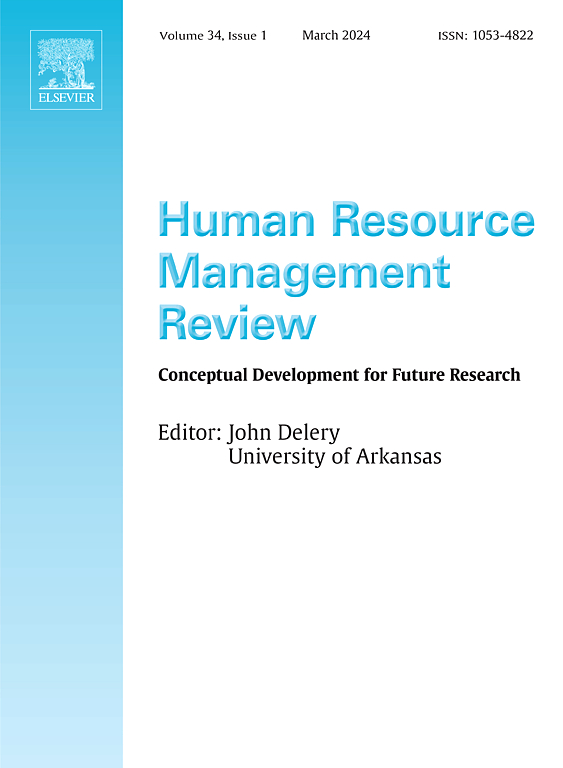Trust repair in politically polarized workplaces
IF 13
1区 管理学
Q1 MANAGEMENT
引用次数: 0
Abstract
As the political landscape has grown more contentious in recent years, workplaces (as a microcosm of society) have encountered increased political polarization. Researchers and practitioners alike have noted that political polarization undermines workplace relationships and the trust that sustains them. In response, I integrate trust repair research with the broader conflict management literature to develop a conceptual model of trust repair in politically polarized workplaces. These insights yield a new construct (constructive engagement) posited to occupy a central role in facilitating increased trustworthiness perceptions of a coworker in one's political outgroup. Drawing from the contact hypothesis (Allport, 1979), I also propose how organizations can create and maintain conditions that strengthen the beneficial effects of constructive engagement. Finally, I argue that repaired perceptions of trustworthiness will lead to repaired trust at both individual and relationship levels, and ultimately more constructive psychological and behavioral outcomes.
在政治两极分化的工作场所修复信任
近年来,随着政治格局变得越来越有争议,工作场所(作为社会的一个缩影)遭遇了越来越多的政治两极分化。研究人员和从业人员都注意到,政治两极分化破坏了职场关系和维系这种关系的信任。作为回应,我将信任修复研究与更广泛的冲突管理文献相结合,开发了一个政治两极分化工作场所信任修复的概念模型。这些见解产生了一种新的结构(建设性参与),它在促进提高同事在政治外群体中的可信度方面发挥着核心作用。根据接触假说(Allport, 1979),我还提出了组织如何创造和维持加强建设性参与的有利影响的条件。最后,我认为修复的可信度感知将导致修复的信任在个人和关系层面,最终更有建设性的心理和行为结果。
本文章由计算机程序翻译,如有差异,请以英文原文为准。
求助全文
约1分钟内获得全文
求助全文
来源期刊

Human Resource Management Review
MANAGEMENT-
CiteScore
20.20
自引率
7.00%
发文量
0
审稿时长
48 days
期刊介绍:
The Human Resource Management Review (HRMR) is a quarterly academic journal dedicated to publishing scholarly conceptual and theoretical articles in the field of human resource management and related disciplines such as industrial/organizational psychology, human capital, labor relations, and organizational behavior. HRMR encourages manuscripts that address micro-, macro-, or multi-level phenomena concerning the function and processes of human resource management. The journal publishes articles that offer fresh insights to inspire future theory development and empirical research. Critical evaluations of existing concepts, theories, models, and frameworks are also encouraged, as well as quantitative meta-analytical reviews that contribute to conceptual and theoretical understanding.
Subject areas appropriate for HRMR include (but are not limited to) Strategic Human Resource Management, International Human Resource Management, the nature and role of the human resource function in organizations, any specific Human Resource function or activity (e.g., Job Analysis, Job Design, Workforce Planning, Recruitment, Selection and Placement, Performance and Talent Management, Reward Systems, Training, Development, Careers, Safety and Health, Diversity, Fairness, Discrimination, Employment Law, Employee Relations, Labor Relations, Workforce Metrics, HR Analytics, HRM and Technology, Social issues and HRM, Separation and Retention), topics that influence or are influenced by human resource management activities (e.g., Climate, Culture, Change, Leadership and Power, Groups and Teams, Employee Attitudes and Behavior, Individual, team, and/or Organizational Performance), and HRM Research Methods.
 求助内容:
求助内容: 应助结果提醒方式:
应助结果提醒方式:


